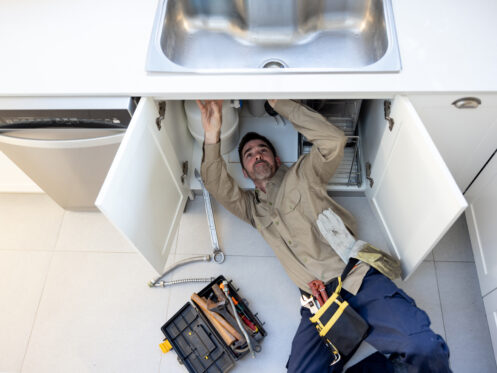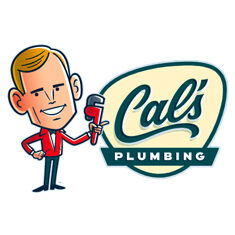In the conversation about home energy efficiency, we often focus on insulation, heating and cooling systems, and energy-efficient appliances. However, one essential element that frequently gets overlooked is a home’s plumbing system. The role of plumbing in home energy efficiency is pivotal yet understated, as it directly impacts a household’s water and energy consumption patterns. In this article, we’ll look at all the ways your plumbing system can contribute to a more energy-efficient home.
Reducing Water Waste
One of the simplest connections between plumbing and energy efficiency is water usage. When we think of plumbing, we usually think of water conservation, which is only one side of the coin. The less water we use, the less energy is required to pump, heat, and treat that water.
Low-Flow Fixtures
The introduction of low-flow fixtures, including toilets, showerheads, and faucets, is among the most significant advancements in energy-efficient plumbing. These fixtures are designed to use significantly less water than their traditional counterparts; for instance, older toilets use about 3.5 gallons per flush, while newer, low-flow models can use less than 1.28 gallons.
Leak Repairs
Water leaks in a home are often underestimated in terms of their impact on both water conservation and energy usage. You may not realize it, but a dripping faucet can waste up to 3,000 gallons of water per year. Similarly, a silent toilet leak can waste even more without a homeowner’s immediate knowledge.
These leaks demand more from municipal water supplies and require excess energy to treat and pump the water into homes. Moreover, hot water leaks compound this issue by not only wasting water but also the energy used to heat that water. Addressing leaks promptly is a critical step in improving a home’s overall energy efficiency.
Enhancing Water Heating Efficiency
Water heating accounts for a large portion of a home’s energy consumption. According to the United States Department of Energy (DOE), it is the second largest energy expense, accounting for approximately 14% to 18% of utility bills, or $400 to $600 per year on average. A plumbing system that is optimized for energy efficiency can substantially reduce the energy needed to heat water.
Tankless Water Heaters
Unlike traditional models, tankless water heaters only heat water as it’s needed, avoiding the energy-intensive process of maintaining a full tank of hot water around the clock. By supplying hot water only as required, these units reduce energy consumption by up to 30%. Tankless water heaters also have a longer life span than traditional models, which adds to their economic and environmental efficiency.
Insulation of Pipes
Insulating hot water pipes reduces heat loss as water travels from the heater to the faucet or appliance. Pipe insulation involves wrapping pipes with materials that have high thermal resistance, meaning they are effective at reducing heat flow.
Common materials used for pipe insulation include polyethylene foam, fiberglass, and foam rubber. These materials cover the pipe and act as a barrier, slowing down the rate at which heat escapes from the hot water within the pipe to the cooler ambient air outside. This results in warmer water being delivered quicker and reduces the need to run water while waiting for it to heat up, saving both water and energy.
Smart Plumbing Systems
The integration of smart home technology with plumbing systems holds great promise for energy efficiency. Smart water heaters, leak detectors, and automated shutoff valves help maintain efficiency and prevent waste.
Smart Water Heaters
Smart water heaters are equipped with internet-enabled controllers and sophisticated software that allow them to be managed remotely through smartphones, tablets, or computers. This connectivity enables homeowners to adjust settings, monitor usage, and receive notifications about their water heating system from anywhere at any time. By making water heating more efficient, smart water heaters contribute to the broader goal of reducing greenhouse gas emissions associated with residential energy use.
Leak Detection Systems
Smart leak detectors can provide real-time alerts to homeowners about potential leaks, often before they are visibly detectable. Leak detection systems typically involve a combination of sensors and a centralized monitoring system. These sensors are strategically placed in areas prone to leaks, such as under sinks, near water heaters, and around toilets.
The Environmental Protection Agency (EPA) estimates that household leaks can waste nearly 1 trillion gallons of water annually nationwide. Early detection and repair of leaks are therefore essential for both conservation efforts and protecting the home investment.
Renewable Energy Integration
While much focus is placed on electricity generation, renewable energy can also play a pivotal role in how we approach home heating and plumbing systems. Harnessing the power of natural resources like the sun and the earth itself, modern plumbing can be reimagined to not only supply water but also to do so in a way that is more efficient and uses fewer resources.
Solar Water Heaters
Solar water heaters represent another trend in energy-efficient water heating. They utilize solar thermal collectors to transform sunlight into heat, which is then transferred to the water. Despite the up-front cost, these systems offer substantial reductions in energy use and monthly bills over the long term. They can operate independently or in conjunction with conventional water heating systems, providing an important buffer against rising energy costs.
Heat Pump Water Heaters
Heat pump water heaters use electricity to move heat from the air or ground to heat the water, rather than generating heat directly, which makes them two to three times more energy-efficient than conventional electric water heaters. They do require installation in locations that remain in the range of 40 degrees to 90 degrees Fahrenheit throughout the year and provide at least 1,000 cubic feet of air space around the heater.
Hot Water Recirculation Systems
Hot water recirculation systems are another effective way to enhance water heating efficiency. These essentially create a loop from the water heater to the fixture and back again. Instead of allowing cold water to drain out as you wait for hot water, the recirculation system sends this water back to the heater. This not only saves water but also energy, as already-warmed water is recycled.
Cost Effectiveness of Upgrades
While the up-front costs of energy-efficient plumbing upgrades can be substantial, the long-term savings and environmental benefits will support the investment. When evaluating the cost-effectiveness of these improvements for your home, carefully consider your specific water and energy usage patterns, the utility costs in your area, and potential rebates or incentives.
Get Professional Advice
Effective plumbing is foundational to an energy-efficient home. From reducing water waste to enhancing water heating efficiency and embracing smart home integrations, advancements in plumbing technology and practices contribute significantly to overall home energy efficiency.
Cal’s Plumbing is a family-owned business that has been providing extraordinary service to the Tucson community since 1948. We handle everything from installing new pipes or fixtures to fixing clogged drains or slab leaks. The services we offer extend beyond plumbing into water treatment and heater installations, ensuring you have access to comprehensive water management solutions in your home.
Contact us at Cal’s Plumbing if you’re considering upgrading your appliances with a tankless water heater or a modern leak detection system.





